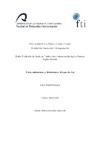Please use this identifier to cite or link to this item:
https://accedacris.ulpgc.es/jspui/handle/10553/73753
| DC Field | Value | Language |
|---|---|---|
| dc.contributor.advisor | González Quevedo, Marta | es |
| dc.contributor.author | Martel Navarro, Lidia | es |
| dc.date.accessioned | 2020-07-22T10:57:59Z | - |
| dc.date.available | 2020-07-22T10:57:59Z | - |
| dc.date.issued | 2020 | - |
| dc.identifier.uri | https://accedacris.ulpgc.es/handle/10553/73753 | - |
| dc.description.abstract | En la actualidad, el ser humano se encuentra restringido y, en ocasiones, controlado por determinadas convenciones sociales que convierten distintas acciones y conductas consideradas extrañas, desagradables u ofensivas en tabúes. No se deben quebrantar ni de acción, ni de palabra. Esto último implica que no se deben verbalizar en voz alta ni escribir. Así, los tabúes sociales se concretan en tabúes de tipo lingüístico, es decir, términos y expresiones insultantes o que se refieren a temas delicados preferiblemente evitables. Como traductores este hecho nos interesa, porque nos condiciona e influye en el proceso de traducción. A veces elegimos mantenerlos, a veces los rompemos. En este Trabajo de Fin de Grado, nos centraremos en el tratamiento del tabú en el ámbito de la traducción audiovisual (TAV) con el ejemplo de la película estadounidense de comedia, Ted (2012). Para ello, en la fundamentación teórica, estudiaremos las características de la TAV y todo lo que esta implica. Posteriormente, profundizaremos en el tabú y en los mecanismos que surgen de este, la eufemización y la disfemización. Para la parte práctica, recopilaremos los distintos tabúes que aparecen en la versión original del largometraje y analizaremos las estrategias que se han aplicado ya sea suavizándolos (eufemismo) o endureciéndolos (disfemismo) tanto en el doblaje como en la subtitulación. De este modo, descubriremos qué resultados se han obtenido en cada caso. | en_US |
| dc.description.abstract | Currently, human beings are restricted and sometimes controlled by certain social conventions that turn different actions and behaviours considered strange, unpleasant or offensive into taboos. They must not be broken either in action or in word. The latter implies that they should not be spoken aloud or written. Thus, social taboos become linguistic taboos, this means terms and expressions that are insulting or refer to sensitive and avoidable subjects. As translator, this fact interests us, because it conditions and influences us in the translation process. Sometimes we choose to keep the taboo, sometimes we break it. In this final degree project, we will focus on the treatment of the taboo in the field of Audiovisual Translation (AVT) with the example of the American comedy film, Ted (2012). For this, in the theoretical foundation, we will study the characteristics of the AVT and everything that it implies. Subsequently, we will examine in greater depth the taboo and the mechanisms that arise from it, euphemization and disphemization. For the practical part, we will collect the different taboos that appear in the original version of the film and we will analyse the strategies that have been applied either by softening them (euphemism) or by hardening them (dysphemism) both in dubbing and in subtitling. In this way we will discover what results have been obtained in each case. | en_US |
| dc.language | spa | en_US |
| dc.subject | 570113 Lingüística aplicada a la traducción e interpretación | en_US |
| dc.subject.other | Traducción audiovisual | es |
| dc.subject.other | Tabú | es |
| dc.subject.other | Eufemismo | es |
| dc.subject.other | Disfemismo | es |
| dc.subject.other | Doblaje | es |
| dc.subject.other | Subtitulación | es |
| dc.subject.other | Audiovisual translation | es |
| dc.subject.other | Taboo | es |
| dc.subject.other | Euphemism | es |
| dc.subject.other | Dysphemism | es |
| dc.subject.other | Dubbing | es |
| dc.subject.other | Subtitling | es |
| dc.title | Tabú, eufemismos y disfemismos. El caso de Ted | es |
| dc.type | info:eu-repo/semantics/bachelorThesis | en_US |
| dc.type | BachelorThesis | en_US |
| dc.contributor.departamento | Departamento de Filología Moderna, Traducción E Interpretación | es |
| dc.contributor.facultad | Facultad de Traducción e Interpretación | en_US |
| dc.investigacion | Artes y Humanidades | en_US |
| dc.type2 | Trabajo final de grado | en_US |
| dc.description.notas | Doble titulación de Grado en Traducción e Interpretación Inglés-Alemán e Inglés-Francés | en_US |
| dc.utils.revision | Sí | en_US |
| dc.identifier.matricula | TFT-59851 | es |
| dc.identifier.ulpgc | Sí | es |
| dc.contributor.titulacion | Programa de doble titulación: Grado en Traducción e Interpretación: Inglés-Alemán y Grado en Traducción e Interpretación: Inglés-Francés | es |
| item.fulltext | Con texto completo | - |
| item.grantfulltext | open | - |
| crisitem.advisor.dept | GIR IDETIC: División de Traducción e Interpretación y Aprendizaje de Lenguas | - |
| crisitem.advisor.dept | IU para el Desarrollo Tecnológico y la Innovación en Comunicaciones (IDeTIC) | - |
| crisitem.advisor.dept | Departamento de Filología Moderna, Traducción e Interpretación | - |
| Appears in Collections: | Trabajo final de grado | |
Page view(s) 1
439
checked on Jan 11, 2026
Download(s)
6,496
checked on Jan 11, 2026
Google ScholarTM
Check
Share
Export metadata
Items in accedaCRIS are protected by copyright, with all rights reserved, unless otherwise indicated.
